A View from the Bradford Occupation
Tagged as: education_struggles free_spaces social_strugglesNeighbourhoods: bradford_university
One student's opinon on what happened over the last week. Including such classic moments as "The University of Bradford Occupation", the controversial "Lollipop Ladies and Laddies", the arrest of youths in Bradford city centre and the spectacle of Thursday the 9th's demonstration in London.
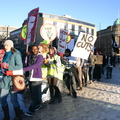
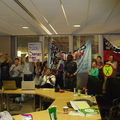
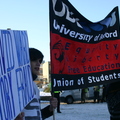
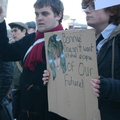
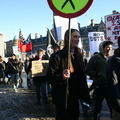
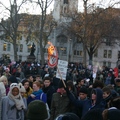
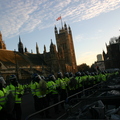
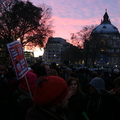
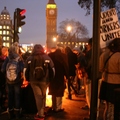
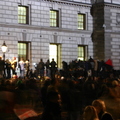
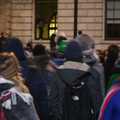
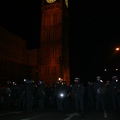
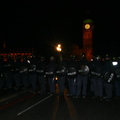
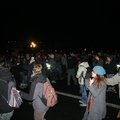
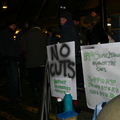
Click on a thumbnail for a slideshow view
Links disclaimer: throughout this article various links will take you to the best information sources I could find - some of these will be corporate sites trying to sell you crap, others will simply want to harvest your IP address for their own mysterious purposes. Northern Indymedia uses RemoveIP to anonymise your browsing (and publishing) - we cannot offer any similar assurances once you click away from this site. Particularly in these times of activity we need to take care over our use of the internet, see this article on why using facebook, google and other corporate providers are a threat to your action.
This past week has seen the most radical action of students in Bradford for a good while. This morning the week-long occupation of the management suite came to an end, as the jubilant occupiers marched through the campus, satisfied that they have begun a struggle with some surprising success. Though the battle on the parliamentary level was narrowly lost in the House of Commons on Thursday, as MPs voted for raising tuition fees for university education to a possible £9000 while cutting direct funding for undergraduate teaching by 80%, it is clear that the war is far from over.
A few committed students spent weeks of tiring and often disappointing awareness-raising and agitation, with the UBU, Bradford's Student Union, getting involved in sending two coach loads of students to London for the legendary November demo that saw the Tory party HQ taking a pounding (see this article for a report). Two weeks later, the date for the Commons vote was released and it became clear that things needed to be picked up a gear. Still it was a job to get any response from the students of Bradford, even when the heavy artillery was unleashed upon the unsuspecting young minds in the form of militant agitators disguised as friendly non-gender-specific crossing attendants (See here for the action). The resultant wee demonstration initially destroyed this particular student's hope for human salvation, and a life of celebrity-following and scotch egg-eating beckoned. However, the demo's return to the uni area was briefly sidetracked into the college, where the sweaty arm of the state took its soon to be repeated slap to the chops of a particular student. The following meeting restored a little fire in the belly, thanks to the inspirational college students and thus the reconstituted meat snacks were put back on the shelf.
Accommodation halls were decked with boughs of flyers, posters of the Vice Chancellor (essentially the CEO of the university) carpeted the walls of the uni, lollipop militants mercilessly baton charged apathetic students and suddenly there was a lecture theatre full of anger facing an increasingly uncomfortable VC. He realised universities like Bradford were to be shafted under the new proposals, what with Bradford having the fourth highest proportion of students from disadvantaged backgrounds of all universities in the UK (52.3% compared with the English average of 30%, see this report by the University and College Union Universities at Risk). But the VC was lacking in the same moral courage that the school, FE and HE students from around the country had been showing in these mighty times, and refused to publicly state his opposition to this ideological barbarism that the government was proposing for fear of retribution when the measures were passed (Even Bradford Uni's celebrity Chancellor, the hunky favourite of graduate's mums Imran Khan, came out in open opposition to the reforms). Whipped up into a fury by this limp display of real politik, a hefty chunk of the students declared they would occupy. Quickly they gathered their considerable bulk, tightened their breeches, took a deep breath and marched into what must be one of the most luxurious sit-ins ever to be held.
The octagonal meeting table was admired while the couches were tested; the behemoth flat screen TV was fondled as the thirsty academics tucked into the complimentary refreshments; the huge landscape painting was marvelled over as the security guards briefly turned on each other on what was to be the only conflict of the occupation. The brave students settled into what would be their sometimes sweaty home for the next week.
The occupiers quickly opted to use consensus decision-making (see Seeds for Change for what this means.) which was a new and hilarious practice to most. It became one of the most impressive achievements of the occupation, that people who initially ridiculed the jazz hands and avoidance of majority voting eventually came to strongly defend the deliberative model, long-winded though the meetings were. In what was the major failing of the occupation, the non-students were quickly made to feel unwelcome and were not permitted to re-enter once they left. This was due to an "agreement" reached between the UBU and security that permitted the occupation to continue. Tensions around this were never resolved, though it was clear it was a compromise that allowed us to lounge around in the management department and disrupt the workings of the upper levels. Yet, it severely hampered the potential of the occupation to reach out to the rest of society to build the links of solidarity that we wanted. The lack of autonomy was recognised early on, as the UBU initially fully supported the occupation to the extent that there was always an elected sabbatical officer present. When the UBU effectively removed their support, isolating the sabbatical officers that had sweated blood to get the movement going, the rules never changed. This mistake will surely not be repeated, autonomy for the student solidarity movement has come to be seen as fundamental.
Meetings with the senior management bore a little fruity treat (see here) but already by this point the occupation had taken on greater significance than a statement from the university bigwigs. Nefarious plans were being hatched and the eggs of ideas required a constantly warm space to be nestled under our collective arse. The local Lib Dem MP was targeted, the students marched onto the streets to meet their supporters and then to London.
Thursday the 9th of December 2010 may come to play a key part in this unfolding historical drama. Much has been said about it already, the "professional anarchists" of David Davies, the 'feral thugs' of our glorious leader David Cameron, the royals being prodded, the treasury, supreme court and Oxford Street smash ups. Less is being said about the treatment of Alfie Meadows and Jody McIntyre (see here, and here for more), the cavalry charges, the battery of hundreds, the detention of thousands for up to 9 hours and the great treachery of the parliament (See London Indymedia's coverage for a more detail). We witnessed a government of back-stabbers and millionaires passing legislation condemning future generations to the slag heap from behind multiple lines of heavy fencing, riot police, horses and vans. Defended by people whose jobs will be next. The delicious irony.
Bradford sent a coach load of occupiers and students, armed to the teeth with banners and lollipop sticks, hell bent on having their reasoned argument heard in a series of witty chants. Respect must be given to the UBU for organising this coach and taking good care of the students who went, some of whom had never been to a demonstration before and were shocked by the violence of the police (shame on the two UBU sabbs who left on the coach while one remained kettled with 20 students). As we joined the tens of thousands in Parliament Square, it was clear to some that a kettle may be coming soon. Some of us escaped down Whitehall before the roads were blocked, and they could witness the festive actions outside. The rest were held in Parliament Square, effectively detained without food, water or toilets for 9 hours. We witnessed apocalyptic scenes of revelry, brutality, anarchy, and solidarity. Some were traumatised, some were ecstatic. We saw how people supported each other, encouraging younger ones to cover their faces when taking action, learning from the witch-hunt that followed the Millbank sacking. We saw the frustration of the precarious youth as they turned on one of our group, determined to get their hands on one of the legendary lollipop sticks. We saw people giving out tea to cold demonstrators, we saw people sharing food and tobacco with strangers, we saw epic conga lines, we saw rage focused on the treasury building as chants of "We Want Our Money Back" and warrior samba drumming urged the protesters to enter the building by any means possible. We saw Jody dragged from his wheelchair, we saw people stand tall against horse charges, we saw fires burning everywhere. We saw trust in politicians melt into a disgusting blob, reminiscent of Michael Gove's face. The news filtered out that the government majority had been reduced to 21 but they had had their wicked way. We were ready to go home.
Our coach had to leave London at 8.30pm, we knew we wouldn't be making it. When we thought we had finally been released from the enormous detention square onto Westminster Bridge, jubilation returned, the struggle would continue and we knew who our enemies were. Then the familiar sight of lines of coppers greeted us on the other side of the bridge. A further 2 hours were spent in freezing conditions in the middle of the famous bridge over the Thames. But downtrodden we were not to be; giant games of hockey-cokey ensued. The school disco classic of the Macarena dance was resurrected, as lines of hardcore protesters vigorously thrusted their icy groins at the dour black-clad troublemakers of the Metropolitan police. Relay races and mass renditions of Oasis classics kept up the spirits, and pressing bladders were temporarily forgotten. One of our group had to seek medical attention due to a heart condition, to which the sympathetic police medic responded, "You shouldn't be at protests if you're not well." Cheers.
Eventually, at about 11.30pm we were released through a dark tunnel of jeering and sneering coppers with the bright light of the FIT squad camera crew at the end, signally our passage into the other world of police database fame. (Experience this here) A happier reception greeted us in the form of legal support people who had been handing out bust cards earlier, now offering bread rolls and water to the faint and frozen heroes. On we travelled to the good people at the School of Oriental and African Studies occupation, where comfy bean-bags, warmth and the sweet smell of human bodily action flowed into us as we crashed exhausted onto the liberated floor. We were made clear that the Bradford occupation was indeed part something much grander, a forming network of movements and spaces for thought and direct action.
Back to Bradford and preparations were under way for Saturday's day of action. The Bradford People's Coalition Against Cuts had organised a demo in the city centre, the students attended and seemingly spontaneously a group made their way to Topshop to occupy it in the face of Phillip Green's dubious tax evasion (See the UK Uncut website for other related actions). When moving into the Kirkgate Shopping Centre, to get in Vodafone's face, two youths were arrested, seemingly with no reason, provocation or logic (video of one here). Police were rattled, targeting the young as they now know that fear is being forgotten and people are furious. This reporter must conclude that the scare/frustration tactics of the defenders of the status quo will only serve to clarify that police are fundamentally protectors of a parody of democracy which will not hesitate to use sickening force when it is under threat.
A different form of democracy was exercised over the last week. One in which the majority didn't trample over the minority, in which all views were listened to and deliberated, in which everyone was respected and empowered to lead. This was the true achievement of the Bradford occupation. It created a feeling of collective power that will be difficult to crush, more so because the occupiers know they are part of a historical moment that extends beyond the campus and Bradford.
The struggle will continue as the occupiers regroup to form a movement, that aims to repeal the flawed education reforms, to show solidarity to student struggles from the international to the local level, to take action that the official student unions cannot take and to make links with all who oppose the sale of our future and public services.
See you soon.





